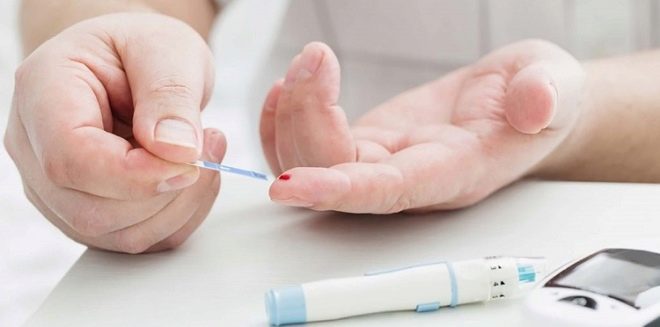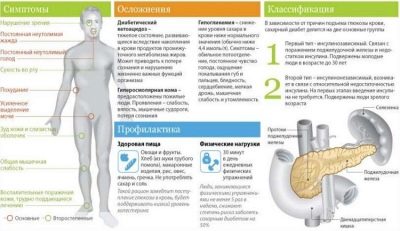Psychosomatics of diabetes in children and adults
Diabetes among adults is quite common - about 4.5% of people on the planet suffer from this disease. Among children, diabetes is not so widespread - only about 0.5% of small patients with such a diagnosis are known. Researchers sound the alarm - every 10 years the number of patients with diabetes doubles.
According to the International Diabetes Federation, today 430 million adults live on the planet with such a diagnosis, while almost 40% of them do not know about their illness.
General information about the pathology
Under one name lies a whole group of endocrine diseases that are associated with different mechanisms of development. With this disease, there is no normal ability to absorb glucose, there is a deficiency of the hormone - insulinthat contributes to the increase in the quantity of sugar in the blood and urine.
The disease has a chronic course and leads to abnormalities of almost all types of metabolism - fat, carbohydrate, mineral, water-salt and protein.
WITHType 1 acharial diabetes is often referred to as youthful., although it can be exposed to people at any age. It is associated with lifelong insulin deficiency. It is believed that the reasons may be autoimmune reactions that cause the destruction of beta cells, but until the end of this physicians are not sure. Also allocated idiopathic first diabetes, the causes of which even hypothetically can not be called.
Type 2 diabetes is the most common type (up to 80% of all cases). It is associated with the lack of the desired response of insulin-dependent tissues and cells to this hormone.
Among the causes of diabetes are often called abnormal development of the thyroid gland, and, more precisely, its endocrine part, diseases of the pancreas. Also distinguish diabetes, developed on the background of medication, infections.
Gestational diabetes is distinguished, which sometimes develops in women in the happy months of waiting for a child. It suddenly appears and, in the overwhelming majority of cases, also unexpectedly disappears after birth.
Blood oversaturated with glucose can cause severe changes in the normal functioning of the kidneys, skin, blood vessels and heart. The organs of sight suffer - diabetic retinopathy may develop. Pathological changes in the joints, brain and psyche (diabetic encephalopathy) develop.
Psychosomatic causes
Psychosomatics has made a significant contribution to determining the causes of diabetes mellitus, assessing the disease not only from the evidentiary position of the laboratory picture and physiological changes, but also from the point of view of the mental state, which can negatively affect the work of the endocrine glands, and, in fact, becomes the starting one mechanism.
Everyone loves sugar. It replaces much with love itself, as it gives a feeling of well-being and peace of mind through the intensification of serotonin production. When adults cannot give a child as much love as he needs, they buy sweets for him.
The state in which insulin is produced in the body little, and sugar is not absorbed as it should, can be interpreted as a conscious refusal of a person to share with the world of real love and feelings.
Psychoanalysts who watched tens of thousands of diabetics derived two psycho-types that most often suffer from diabetes:
- narcissists ("daffodils");
- people who do not accept the unselfishness of love as such, do not believe in it.
Narcissists, who demand only love, admiration, respect for their person from others, usually suffer from some infantilism. They are extremely touchy, and the insult is aimed at anyone who does not understand that this world was created exclusively for him, the "narcissus." They consume love more than they can assimilate, and almost do not give it away to others.. This habit is laid mainly in childhood, and so the child's parents and grandparents do it themselves. He often develops type 1 diabetes.
If such a long-awaited, sleek, only child worn on his hands at his 8 years old by the whole family, including his grandfather and grandmother, is brought to a pediatrician, usually the cause of diabetes is eroded — genetic predisposition. She doesn’t need to prove or refute the doctor, and besides, she fully satisfies the parents of the sick child - relieves them of responsibility. It is unlikely that they would have been delighted with the doctor, who will honestly say that the child is an egoist and was “overfed” with love.
Instead of instilling in a child the ability to love someone completely disinterestedly, sincerely, with all my heart, they will stuff him with pills that will not solve the main problem at all, and diabetes will remain with him for the rest of his life.
The same type of diabetes develops in adults who are prone to overweight and obesity. In itself, obesity, in terms of psychosomatics, means the accumulation of feelings, unrequited and unrealized love. In order to somehow compensate for the lack of love, such people begin to replace it with sweets.
If you see a person with extra pounds who loves chocolate or sweets, then you can be sure that with love a person is not all right. At the same time, a person can be quite attractive, but the prospect of sharing with the world the accumulated love and giving it away to a person seems unattractive.
Such diabetics do not perceive criticism in their address, they treat it painfully. They accumulate love gradually, and at times inflammation of the pancreas caused by viruses is a factor provoking the disease.
Type II diabetes is closely associated with the reluctance to accept love from the outside world. It seems to a person that there is nothing to love him, there is no disinterested love, therefore glucose ceases to be absorbed in the body.. Very often, this type of diabetes occurs in disappointed people, the elderly, middle-aged people. And the reason may even lie in the events of youth, when love was rejected.
Such people often live alone or unhappy in marriage.. They devalued love to such an extent that their body categorically refuses to accept it as something necessary. Many close themselves inside. A fairly common example: a man who cannot openly love with all sincerity, because he suspects that a woman simply uses it, wants to get his money, his house, to seize his property. He does not even admit the thought that he can be loved just like that.
A child has such diabetes, although rarely, but it is possible. The reason will be the lack of love in his own family, where he did not receive it from his parents. Sometimes the disease starts at a later age, but the root cause remains “childish,” due to the fact that a person from an early age is used to being unloved. He just does not know what it is to receive love from outside.
It is worth noting that diabetic people are often passionate people who give all their love to their idea - innovators, scientists, revolutionaries. Almost always they love their work with all their hearts, but they are not capable of loving people. However, their tendency to sweet is very high.
Women whose men are constantly busy with their “revolutions” and business projects are at risk of getting diabetes.. Since they live in a state of severe lack of attention and love from their partner, they gradually stop believing in it, which triggers a violation of glucose uptake by the body.
Treatment
Psychotherapists warn that the treatment of diabetes should not be limited only to medications and a diet prescribed by an endocrinologist - a course of psychocorrection cannot be done. After establishing the type of diabetes, it is important to understand which of the two behaviors led to one of the two types of pathology.
Learning to love and accept love is not easy. But it is possible, and this should be sought. The work will require tremendous and from the psychologist, and from the patient. Love takes root gradually, you can start with a pet.
For starters, you can have someone you can love without counting on love in return, for example, a hamster or fish. Cats and dogs for treatment in case of diabetes of the first type are not suitable, as they can give love in return.
An excellent solution is a bonsai tree that a person can love and care for..
The second stage is to learn to accept criticism. Grievances while living and letting go, but not saving them. Only in this way can one learn to correctly and moderately perceive oneself.
There is an excellent psychotherapeutic method in which a person needs to find negative qualities in himself, remember his bad deeds and tell about them out loud. But this must be done in the presence of a stranger, who, unlike his relatives, is not obliged to accept and justify his faults in a “narcissus”.
If a child is sick, his parents should make an effort.
It is necessary to gently press the child from the throne, on which he was seated, to deprive the crown and stop indulging all his whims. The pet presented to the child will help him to understand that love can and should not only be taken, but also given.
With the second type of diabetes, psychosomatics is different, therefore psychocorrection will be different. It is important to show the person that the world is full of love, it is everywhere, and it should be accepted with gratitude. Here you can have a cat or a dog who knows how to love in response to human care.
There are some psychotherapeutic techniques that allow you to raise self-esteem. Communicating with children, grandchildren, sharing leisure time with family and friends will also be beneficial.. Sometimes you need a conversation with a partner or other relatives - you need to convince them that the diabetic in their family needs their attention and love.
The development of diabetes in a person always indicates a problem with such an important and vital feeling as love. If it is not enough, it is necessary to be treated by increasing the amount of kind and bright feeling in life. If it is a lot of it, and it is aimed at itself, beloved, then you need to gradually learn to give surplus to others. A person who has found a balance between taking and giving love in his life, despite heredity, unhealthy diet, and even respect for sweets, will never get sick with diabetes.

















